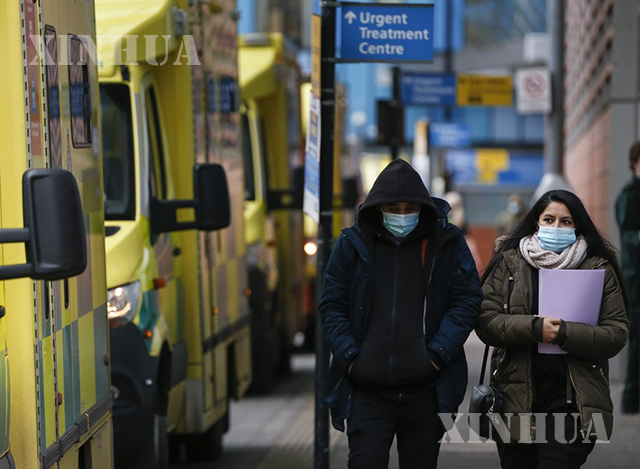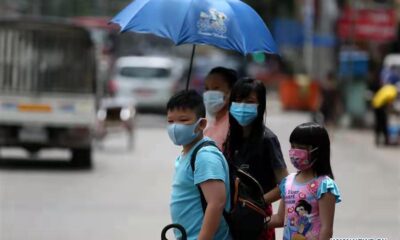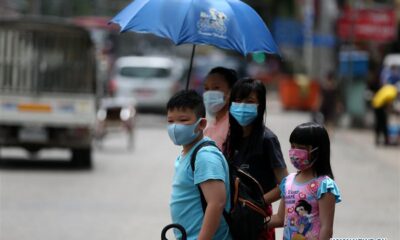WORLD
ကမ္ဘာပေါ်တွင် COVID-19 ကူးစက်ခံရသူ သန်း ၁၀၀ ကျော်ရှိလာ ၊ နိုင်ငံတိုင်း ပြင်ဆင်မှုအပိုင်းကို တွန်းအားပေးဆောင်ရွက်သင့်ဟု ကျွမ်းကျင်သူပြော

နယူးယောက်၊ဇန်နဝါရီ ၂၇ ရက်(ဆင်ဟွာ)ဘာသာပြန်/ကိုငယ်
COVID-19 ကပ်ရောဂါမှ ရရှိသည့် အလွန်ကြီးမားသော သင်ခန်းစာ တစ်ခုအနေဖြင့် နိုင်ငံတိုင်း နိုင်ငံတိုင်းသည် ကပ်ရောဂါအတွက် ကြိုတင်ပြင်ဆင်မှုများကို တွန်းအားပေးဆောင်ရွက်သွားရန် လိုအပ်ကြောင်း အမေရိကန်နိုင်ငံ ကယ်လီဖိုးနီးယားဆန်ဒီယေဂိုတက္ကသိုလ် ( University of California San Diego ) မှ ကမ္ဘာလုံးဆိုင်ရာကျန်းမာရေးသိပ္ပံပညာဌာန တွဲဖက်ဌာနမှူး Steffanie Strathdee က ဆိုသည်။
ဆင်ဟွာသတင်းဌာနနှင့်မကြာသေးခင်က ပြုလုပ်သော တွေ့ဆုံမေးမြန်းမှုတွင် Strathdee က “ ဒီကပ်ရောဂါ ကူးစက်မှု သန်း ၁၀၀ အထိ ရောက်ရှိလာခဲ့ခြင်းဟာ ထိတ်လန့်စရာ သမိုင်းမှတ်တိုင်တစ်ခုပါပဲ ၊ ဒီထက်ပိုပြောရရင် ဘာကြောင့်လဲဆိုတော့ တစ်နှစ်အတွင်းမှာပဲ ဒါတွေအားလုံး ဖြစ်ပွားခဲ့တာပါ” ဟု ၎င်းကဆိုသည်။
ဇန်နဝါရီ ၂၆ ရက်တွင် တစ်ကမ္ဘာလုံးအတိုင်းအတာဖြင့် COVID-19 ရောဂါကူးစက်ခံရသူပေါင်း သန်း ၁၀၀ ကျော် ရောက်ရှိခဲ့ကြောင်း ဂျွန်ဟော့ကင်းတက္ကသိုလ် သိပ္ပံနှင့်အင်ဂျင်နီယာဌာန(CSSE) ၏ ထုတ်ပြန်ချက် အရ သိရသည်။ သန်း ၁၀၀ ဆိုသည့် ကိန်းဂဏန်းတွင် “ ကမ္ဘာလုံးဆိုင်ရာ ကူးစက်မှုရဲ့ ၂၅ ရာခိုင်နှုန်းရှိနေတဲ့ အမေရိကန်လို ချမ်းသာတဲ့နိုင်ငံတွေအနေနဲ့ သတိမူသင့်ပြီပေါ့ ၊ ကပ်ရောဂါဟာ အရင်းအမြစ်ဆင်းရဲတဲ့နိုင်ငံတွေကိုလည်း အကန့်အသတ်ပေးမှာမဟုတ်ပါဘူး” ဟု The Perfect Predator စာအုပ်ပူးတွဲရေးသားခဲ့သူ Strathdee က ဆိုသည်။
“ COVID-19 ရောဂါဟာ ကမ္ဘာမှာ မျှော်လင့်မထားဘဲ ရုတ်တရက်ဖြစ်လာတယ်။ ဒါမျိုးတော့ မရှိသင့်ဘူးပေါ့။ ရာစုနှစ်တိုင်းမှာ ကပ်ရောဂါ လေးငါးခုလောက်ဖြစ်တတ်တယ်။ ကျွန်တော်တို့ အလျင်မမီလိုက်ဘူး” ဟု ၎င်းက ပြောကြားခဲ့သည်။
အနာဂတ်တွင် အခြားသော ကပ်ရောဂါများ ထပ်မံဖြစ်ပွားလာနိုင်သည့်အတွက် မတူကွဲပြားသောအဆင့်တိုင်း၌ ကြိုတင်ပြင်ဆင်မှုအပိုင်းကို လုပ်ဆောင်ထားရန်လိုအပ်ကြောင်း Strathdee က ဆိုသည်။ “ COVID-19 ဟာ ၂၁ ရာစုမှာ ပထမဆုံး ပေါ်ထွက်လာတဲ့ ကပ်ရောဂါပါ ၊ ဒါပေမယ့် ဒါက နောက်ဆုံးတော့မဟုတ်နိုင်ပါဘူး ။ ပိုမိုပြင်းထန်တဲ့ကပ်ရောဂါတွေ နောက်မှာ အသေအချာရှိအုံးမယ်။ ဥပမာဆိုပါစို့ ၊ နောက်ထပ်ကြုံလာမယ့်ကပ်ရောဂါတစ်ခုအတွက် ကျွန်တော်တို့အသင့်ဖြစ်နေဖို့ဆိုရင် ကမ္ဘာလုံးဆိုင်ရာ ကျန်းမာရေးတည်ဆောက်မှုပုံစံကို တွန်းအားပေးသွားဖို့ မဖြစ်မနေ လိုအပ်ပါတယ် ” ဟု ၎င်းက ဖြည့်စွက်ပြောကြားခဲ့သည်။
ကမ္ဘာ့ကျန်းမာရေးအဖွဲ့(WHO) ၊ ကုလသမဂ္ဂ နှင့် အခြားသော အဖွဲ့အစည်းများအနေဖြင့် တက်ကြွတဲ့အခန်းကဏ္ဍတစ်ခုမှ ပါဝင်ကာ ပုဂ္ဂလိက – အများဆိုင်ရာ ကျန်းမာရေး မိတ်ဖက်ဆက်ဆံရေး လုပ်ငန်းနှင့်အတူ အစိုးရမဟုတ်သောအဖွဲ့အစည်းများသည် လက်ချင်းချိတ်ဆက်ဆောင်ရွက်သွားသင့်ကြောင်း Strathdee က ဆိုသည်။
ကမ္ဘာလုံးဆိုင်ရာ ကျန်းမာရေးအခြေခံအဆောက်အဦ အစဉ်ခိုင်မာမှုရှိစေရန် ကမ္ဘာ့အဆင့်တစ်ခုဖြင့် ကပ်ရောဂါကြိုတင်ပြင်ဆင်းရေးများ လုပ်ဆောင်သွားရန်လိုအပ်ကြောင်း နှင့် ရောဂါကြိုတင်ကာကွယ်ရေးအားထုတ်မှုများတွင် ညှိနှိုင်းပူးပေါင်းဆောင်ရွက်ရေးလုပ်ဆောင်ရန် ရင်းနှီးမြှုပ်နှံမှုအပိုင်းကို တိုးမြှင့်လုပ်ဆောင်သွားရန် လိုအပ်ကြောင်း အဆိုပါ ကျွမ်းကျင်သူက မှတ်ချက်ပြုခဲ့သည်။
“နောက်ဆုံးပြောလိုတာက နိုင်ငံတွေအနေနဲ့ မဖြစ်မနေ အားလုံးအတူတကွ လက်တွဲပူးပေါင်းဆောင်ရွက်သွားရမယ်။ နိုင်ငံတွေထဲမှာ ဘယ်နိုင်ငံမှ နောက်မှာ ကျန်နေရစ်လို့မရပါဘူး။ အလွန် အဖိုးတန်တဲ့ကျွန်မတို့ရဲ့ လူမှုအသိုက်အဝန်းကို အကာအကွယ်ပေးဖို့ သေချာအောင် လုပ်ဖို့ လိုအပ်ပါတယ်။ ကျွန်မတို့ရဲ့ အားအနည်းဆုံးချိတ်ဆက်မှုကို တက်နိုင်သမျှ အားအကောင်းဆုံးဖြစ်အောင် တစ်ခုတည်းလုပ်ကိုင်သွားရမှာပါ” ဟု ဆရာမကြီး Strathdee က ဆိုသည်။(Xinhua)
———————————————-
(Zawgyi Version)
NEW YORK, Jan. 26 (Xinhua) — The biggest lesson from the COVID-19 pandemic is that every country needs to bolster its pandemic preparedness, said Steffanie Strathdee, associate dean of Global Health Sciences at the University of California San Diego.
In a recent interview with Xinhua, Strathdee said, “100 million cases is a grim milestone in this pandemic, even more so because these cases all occurred within a single year.”
Global COVID-19 cases surpassed 100 million on Tuesday, according to the Center for Systems Science and Engineering at Johns Hopkins University.
The figure of 100 million “should be a wakeup call for richer countries like the United States, which accounts for 25 percent of the global case burden: epidemics are not restricted to resource-poor countries,” said Strathdee, who is also the co-author of a non-fiction thriller The Perfect Predator.
“COVID-19 caught the world off guard and it shouldn’t have. Every century has endured four to five pandemics and we were long overdue,” the expert said.
Strathdee stressed the need to step up preparedness at different levels as other pandemics could appear in the future.
“COVID-19 was the first pandemic of the 21st century but it won’t be the last. The superbug pandemic is right behind it, for example. We need to bolster the global health architecture to ensure that we are ready for the next one,” she added.
The World Health Organization, the United Nations and other agencies have an active role to play and private-public partnerships with industry and non-governmental organizations shall be engaged, said Strathdee.
On a global level, pandemic preparedness needs to be hard-wired into the global health infrastructure and more investment needs to be made to coordinate prevention efforts, the expert noted.
“Finally, countries must all work together to ensure that no country is left behind; within countries, we need to ensure that the most vulnerable people in our communities are protected as well. We are only as strong as our weakest link,” Strathdee said. Enditem
Photo caption – People wearing face masks walk past ambulances at The Royal London Hospital in London, Britain, on Jan. 26, 2021. (Xinhua/Han Yan)






